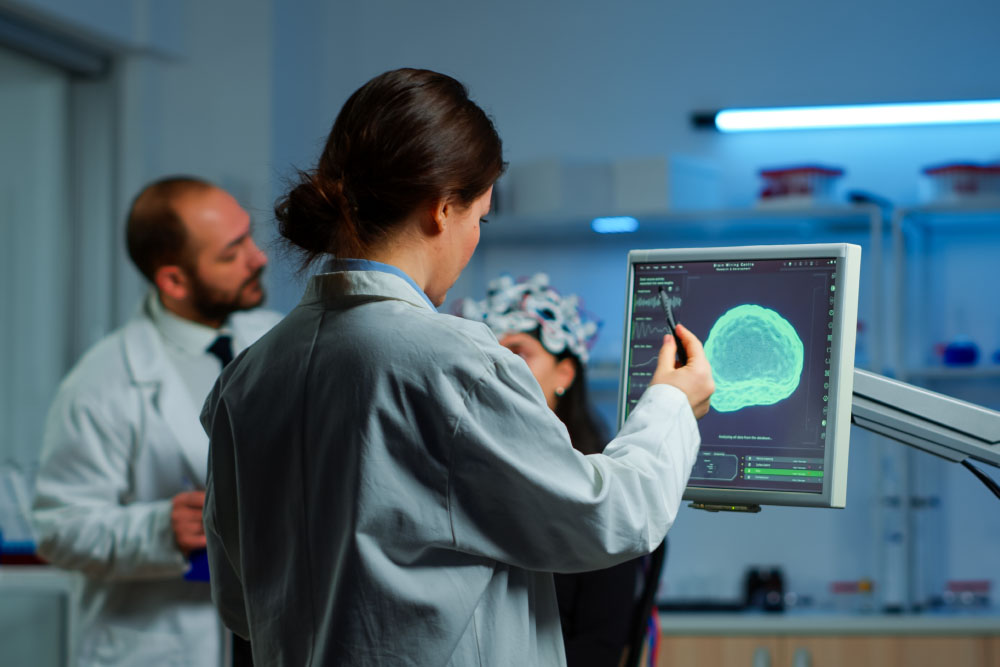-
Dementia Treatment in UAE: What Works, What Doesn’t
-


If your loved one has been showing signs of memory loss, confusion, difficulty finding words, or even changes in personality you’re not alone. Dementia affects thousands of families across the UAE and millions around the world. It’s painful to watch someone you love slowly lose parts of themselves, and the uncertainty about what comes next can feel overwhelming.
Hi, I’m Dr. Noushin Mehrbod, Consultant Neurologist at RAK Hospital. I’ve seen firsthand how dementia impacts not just patients, but entire families. Many people come to us feeling lost — unsure whether it’s just “old age” or something more serious, and worried about what treatments are actually available.
One of the biggest concerns families share with us is this:
“Is there really any treatment for dementia? Or is it all just downhill from here?”
The good news is – there are treatments, and while dementia can’t be cured, we can absolutely slow its progression, manage symptoms, and help the person live a dignified, meaningful life for as long as possible.
The goal of this article is to answer real questions families have about dementia, and to give you clarity about the types of treatments available, how they work, and when it’s the right time to get professional help.
So let’s begin and help you get the answers you need to make confident decisions for your family.
It’s normal for memory to slip a little as we get older misplacing keys, forgetting someone’s name for a moment, or needing reminders more often. That’s part of normal aging.
Dementia is different.
It’s not just about forgetfulness. It’s a medical condition that causes a gradual loss of memory, thinking, reasoning, communication, and even behavior. People with dementia may:
Dementia interferes with daily life, not just memory. It affects how someone handles money, drives, cooks, shops, or even interacts with others. Over time, it can impact their ability to live independently.
So if you’re wondering, “Is this just aging, or something more?” the key sign is how much it’s affecting everyday life. If you’re noticing unusual changes in memory, mood, or judgment that don’t feel like “normal aging,” it’s worth getting evaluated by a neurologist.
Alzheimer’s disease is the most common type of dementia, but it’s not the only one.
At RAK Hospital, when someone comes in with memory or cognitive issues, we assess for a range of possible causes, including:
A proper diagnosis involves reviewing symptoms, medical history, brain scans, and sometimes cognitive tests.
Getting the right diagnosis early is crucial because treatment plans can vary depending on the type and stage of dementia. The sooner we know what’s going on, the sooner we can help slow it down and improve quality of life.
First, it’s important to understand: there is no full cure for dementia yet. But there are treatments that can make a real difference especially if started early.
At RAK Hospital, we approach dementia treatment in a multi-step, personalised way:
How long do they help?
That depends on the type and stage of dementia. Some patients respond well to medication for a few years. Others benefit more from therapy and family support. The key is early detection and a consistent care plan tailored to the individual.
Yes, in many cases, it can. But with one condition: you have to start early.
The medicines we use for dementia don’t “fix” memory loss but they slow it down. They help the brain’s chemical messengers work better, which means:
We’ve seen many patients at RAK Hospital whose lives have improved significantly simply because they started treatment early and followed a proper care routine.
The truth is we can’t stop dementia completely, but in many cases, we can slow it down.
Think of it like this: dementia is a progressive condition, but your actions can influence the speed.
Here’s what we’ve seen work at RAK Hospital:
So, while we can’t “reverse” dementia, many of our patients and their families find hope in knowing they can take small but powerful steps that slow things down — and make everyday life better.
This is one of the most emotionally honest questions we hear from families — and it’s so important to talk about.
Caring for someone with dementia isn’t just about reminding them to eat or take medicine. It’s emotionally draining, sometimes heartbreaking, and often unpredictable.
Here’s what we want caregivers at RAK Hospital to know:
You’re doing enough. Even when it feels like you’re not. Dementia care is not about perfection- it’s about being present, being patient, and doing your best.
At RAK Hospital, we believe dementia care is a family journey and our team is here to walk with you every step of the way.
This is a question many families hesitate to ask they wonder, “Is it too early?” or “Are we overreacting?”
Here’s a simple rule we share at RAK Hospital:
If memory loss, confusion, or behavior changes are affecting daily life it’s time to see a doctor.
Here are a few clear signs you should not ignore:
These symptoms don’t always mean dementia, but they do require medical attention.
At RAK Hospital, our neurology team can help with early diagnosis, detailed brain imaging, and a clear treatment plan all in a calm, supportive environment. Early intervention can make a real difference.
When someone is diagnosed with dementia, one of the first questions families ask is:
“Can it be treated?”
The honest answer is: we cannot cure dementia, but we absolutely can help manage it and, in many cases, we can slow its progression and significantly improve quality of life.
At RAK Hospital, our approach combines medications, non-drug therapies, and family education to support both the patient and their caregivers.
There are several approved medications that help treat symptoms of dementia:
These medications don’t stop the disease, but they can slow the symptoms and make daily functioning easier for many people.
It’s important to understand: every person responds differently. Some may see noticeable improvement, while others may only get modest relief.
That’s why our neurologists closely monitor treatment progress and adjust plans as needed.
Medications aren’t the only answer. In fact, non-drug therapies often bring some of the most meaningful moments for patients and families.
At RAK Hospital, we focus on:
These therapies help with mood, communication, and connection especially when words become harder to find.
The earlier dementia is diagnosed, the more we can do to slow its effects.
With early treatment, many patients maintain independence longer, avoid hospitalizations, and feel more in control of their lives.
That’s why seeking help early even if the symptoms seem small can change everything.
There is no cure for dementia not yet.
But treatment is not just about medicine. It’s about:
At RAK Hospital, we believe that the right treatment for dementia doesn’t just extend life, it enhances the moments that matter.
Choosing where to get care is a big decision and you want a place that treats your loved one like more than just a patient. Here’s what makes RAK Hospital different:
Dementia doesn’t happen overnight it creeps in slowly. A little forgetfulness. A moment of confusion. Repeating things. Losing track of days.
At first, it may feel like “normal aging.” But when memory loss or behavior changes begin to affect daily life, it’s time to act.
The earlier dementia is diagnosed, the more we can do to slow it down, manage the symptoms, and preserve quality of life.
At RAK Hospital, we’re here to help with advanced diagnostics, compassionate care, and a team that supports both the patient and the family every step of the way.
If you or anyone suffering from dementia, let’s talk. Or if you have any further questions, schedule a consultation with one of our neurologists and take your first step towards a healthy life.







